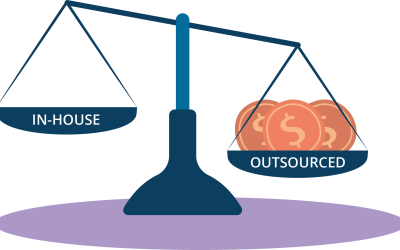Laboratory medical billing falls under the umbrella of healthcare specialties that traditional medical billing companies advertise to serve. However, the laboratory billing cycle is unique and can be complex in the process of recovering compensation, unlike other areas of healthcare services. Without specialized knowledge and processes, traditional medical billing companies can do a disservice to labs in a number of ways and ultimately fail to support the performance of the facility.
Focus on High-Volume, Small-Dollar Claims
A common misconception within the healthcare billing space is that laboratories are cost centers rather than profit centers. Traditional medical billing companies focus their service on high-ticket providers, such as radiology, PET scans, and inpatient admissions in order to receive their cut of the large-dollar claims. Laboratory claims and denials, in many cases, are small margin, lower dollar, and high in volume, meaning they require more work with a perceived lower payout for the traditional medical billing company, so they are deprioritized behind more profitable claims.
The medical laboratory billing cycle has more room for error that can result in labs receiving more denials and less revenue if their billing is handled without proper attention. In fact, a little more than three-quarters of overall Medicare denied claims involve laboratory services. Traditional medical billing companies are likely less inclined to chase the $2-$20 denials they created for labs and unfortunately allow them to accumulate at the laboratory’s cost.
Trending Lower Medicare Reimbursements
Independently owned laboratories, especially startups, face the challenge of remaining profitable while Medicare reimbursements for laboratory claims have had 10% annual cuts for three consecutive years beginning in 2018. Further cuts of 15% to nearly 600 additional clinical laboratory tests are on the horizon in legislation following the end of 2022.
Lower reimbursements may force labs into difficult decisions such as cutting testing menus or being acquired. It is imperative then that laboratories give their billing processes more attention than ever to ensure that their reimbursement is maximized on every test, denials are minimal, and that they have detailed insight into the performance of their lab to make the best decisions for the facility’s well-being. Traditional medical billing companies can easily allow crucial laboratory reimbursements to slip through the cracks and fail to support their best interest without proper knowledge of shifting legislation and fee schedules.
Knowledge of Fee Schedules and Flexible Chargemasters
Each year, laboratory fee schedules released by payers have modifications from the prior year due to changing CPT and HCPCS codes, relative value units, and market data reported by industry. Because these schedules are specific to a continually shifting federal environment for labs, traditional medical billing companies may not have the proper knowledge on updating the fee schedules within their billing processes for labs resulting in more denials and lower reimbursement.
Chargemasters can play a hidden role in a laboratory’s revenue not being fully maximized if not maintained frequently and with attention to a lab’s financial performance. A laboratory’s chargemaster can be affected by modifications, deletions, and additions necessitated by regulatory agency requirements, AMA CPT changes, CMS HCPCS changes, emerging technologies, and facility requests. Traditional medical billing companies can assign labs a general, uniform chargemaster that doesn’t take all of the laboratory-specific factors into consideration.
Software and Reporting Not Catered to Laboratory Billing
Traditional medical billing companies craft their software and reporting to cater to standard healthcare services. This same software and reporting is pushed onto labs as a one-size-fits-all solution despite the unique needs laboratories require in their claim processing and financial transparency in reporting.
Medical billing companies advertise automations in their software that streamline the claim process, but their software may fail to include claim-scrubbing capabilities that laboratories uniquely require to prevent denials. Laboratory medical billing optimally calls for software and a service team of professionals experienced in laboratory billing, where a high volume of low-dollar claims need to be processed accurately and quickly. However, this requires innovative technology within processing accurate CPT and ICD codes, eligibility checks, prior authorization, and adequate patient documentation.
Laboratories may also experience a lack of useful data in the financial reporting that a traditional medical billing company provides. Laboratories have unique billing metrics, or KPIs, that reveal the status of a laboratory’s financial success, or downward trends in performance and profit. Reporting features in a lab billing system should be expected to include critical claim management data, data by payer, data by providers, patient information data, and data by their testing menu. This data is crucial for laboratories to make decisions and utilize for PAMA reporting.
Phytest is a Laboratory Focused Billing Partner
Most traditional medical billing companies are not equipped to dedicate the attention and resources laboratories need for successful claim processing, denial management, and revenue growth. Phytest serves numerous laboratories that have made the switch from subpar medical billing services to our exclusive services and solutions with each laboratory at the center of focus. Our expertise in laboratory billing allows us to prepare individualized solutions for each client with the knowledge of the latest RCM software advances, and federal and state guidelines.
Contact our team of experts today to see how Phytest can partner with you to help your lab expand capability for growth and increase collections.
Read Our Latest Posts
How Physicians Can Reach the Full Potential of Ancillary Laboratory Services
Ancillary services play a crucial role in enhancing patient care while supporting the operational and financial health of physician practices. Among these services, ancillary diagnostic services, such as laboratory testing, are integral to timely diagnoses, effective...
UnitedHealthcare’s Z-Code Requirement for Genetic Testing Claims Impacts Laboratories and Payers
UPDATE: 10/1/2024 UHC began phase 3 of the DEX Z-codes registration. "Claims eligable for phase 3 tests with dates of service on or after Jan. 1, 2025, need to include the appropriate Z-Codes to be considered for reimbursement." Genetic and pathology laboratories are...
Laboratory Medical Billing – Decisions of Profitability
The Complex Landscape of Laboratory Medical Billing The success of a lab truly lies in the foundation of the success of it's laboratory medical billing process. Without proper reimbursement, labs can struggle to remain profitable despite quality volume and test menus....




